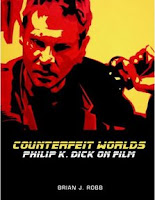
The only time I've ever been refused admittance to a film was when I tried to see BLADE RUNNER (Ridley Scott, 1982). Of course, I was just a few months north of ten years old so the box office girl was well within her rights. Little did she know that I wasn't lying when I told her that my mom was just parking the car and she'd buy the tickets if I couldn't. BLADE RUNNER was starring Harrison Ford — Han Solo, fer chrissakes! I would not be denied.
While a lot of the film was over my ten year old head, I was justifiably fascinated by the film. When TOTAL RECALL (Paul Verhoeven, 1990) came out and I realzed that both films were based on work by the same writer, I was hooked. I've been reading the short stories and novels of Philip K. Dick ever since.
After suffering through IMPOSTER (Gary Fleder, 2002) and marginally enjoying PAYCHECK (John Woo, 2003), I decided to pen an article for Cashiers du Cinemart comparing the stories of Philip K. Dick with the movies they inspired. I had been letting this notion percolate for a while and then I ran across Counterfeit Worlds: Philip K. Dick on Film by Brian J. Robb. This discover saved me a whole hell of a lot of work.
Robb does a great job of going through a cursory look at Dick's career before diving into the author's attempts (Mission: Impossible, The Invaders) and successes (an episode of Out of This World was based on his story "Imposter") in television and film. Robb's three chapters on the road to and highway from BLADE RUNNER feel recycled from Paul M. Sammon's Future Noir. At 73 pages, his coverage of BLADE RUNNER nearly takes up a third of the book, giving scant attention to other works. Certainly, IMPOSTER, SCREAMERS, BARJO, and PAYCHECK don't need as much coverage (although a mention of the ridiculous use of doves in Woo's work was sorely missing) but meatier works like MINORITY REPORT and A SCANNER DARKLY received pretty lean chapters.
While Robb's book isn't the be-all end-all that I was hoping for, it scratched an itch that I had had for a while. I hope that a future edition is in the works; something that will cover Lee Tamahori's NEXT (2007) and flesh out themes of vision and perception in MINORITY REPORT.

No comments:
Post a Comment